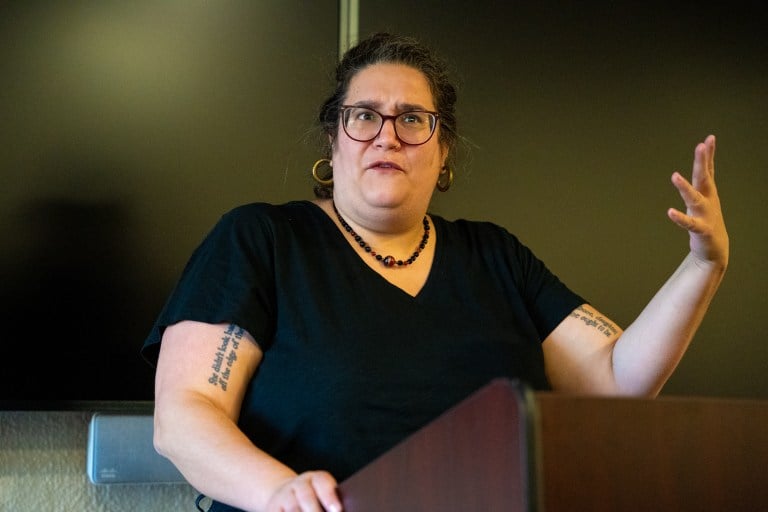Editor’s Note: This article is a review and includes subjective thoughts, opinions and critiques.
On Wednesday evening, audience members initially seemed to pour in gradually to author and essayist Carmen Maria Machado’s Lane Lecture Series reading — that is, until suddenly, every seat was taken and the room buzzed with lively conversation.
The night started out on a humorous note. Machado was introduced by Nick Jenkins, co-director of Stanford’s Creative Writing Program, as he proceeded to read “one long quote” from Associate Professor of English Kirstin Valdez Quade, who was originally supposed to introduce Machado but could not attend the reading.
Through Jenkins’s voice, Quade introduced Machado’s short story collection “Her Body and Other Parties” as “subversive [and] surprising,” her memoir “In the Dream House” as akin to a “thriller” about “terror and entrapment” and Machado’s writing in general as a place she turns to when her own creative work feels stuck.
Carmen Maria Machado wasted no time getting to the prose. She introduced a new story from an “unfinished book” entitled “The Tour,” which will be published as a standalone short story in McSweeney’s Issue 68 this October.
The story was one of an uneasy new sapphic romance, a protagonist navigating a newfound life as a public figure and even (surprise!) shifts between universes — sci-fi, but make it genre-bending and queer. The narrative shifted between scenes and different universes, in many of which our protagonist encounters the same female love interest, which she takes as a sign they are meant to be together. In every universe, the author-protagonist sees great success with her book sales, leading her to seemingly inevitable fame. She grapples with each of these life changes at once, all while hopping chaotically around the multiverse.
Machado’s signature genre exploration took center stage that evening. The multiverse premise is as disorienting for the protagonist as her new one-sided relationship is. In the story, the main love interest is dubbed a “quantum fuckboy” and dishes out several brutal rejections and apathetic statements to our narrator. “The person who cares less always calls the shots,” Machado writes.
The author expressed her amusement when the audience laughed at unexpected places in the story and said “you guys are laughing at really funny lines and I don’t understand and I love it.” The story was made more hilarious as it was read aloud, and carried a personal tone when coming from Machado herself.
When she announced she’d be reading “just one more section” of “The Tour,” I found myself resisting the statement: I wanted to hear more of the captivating story. In the final section, Machado went full-on queer sci-fi, managing to slip in amazing quips including “timelines are queer” and a reference to “Schrödinger’s pussy.”
Machado’s masterful balance between the profound and the hilarious came to a climax with one paragraph in particular, which began with the line “every choice you make whittles away at your future,” and ended with the direct and horny, “I just wanna get fucked, do you understand?!”
And so began the Q&A portion of the evening. Audience members’ questions were centered around Machado’s explorations of horror and feminism, beauty and queerness. Machado said her mind “organizes around horror,” a genre which she thinks is characterized by the audience’s “consistent sense of underlying dread,” rather than merely by the author’s use of cosmetic tropes. Machado writes this characteristic dread into her stories effectively, allowing readers to uncover the immense discomfort and thematic difficulty alive within her words.
Horror, Machado said, is a “tool” to help capture “the nightmare of being alive.” For example, it can help capture the experience of “having a body within the patriarchy or a white supremacist society.” Machado explained how she uses the tool of horror to highlight the real-world horror stories that underpin social existence for many people.
In her discussion of horror as a depiction of reality, Machado said that life is full of “infinite beauty and infinite horrors.” The contradiction of existence, to the author, is that life is “beautiful and terrible.”
An audience member also asked Machado about her inspirations for the story she read that evening. She answered that a multiverse storyline was the only premise that could “hold” the thoughts she was having about writing, trauma and being a public figure.
Machado treated the Wednesday night audience to an entertaining sci-fi story that also tapped deeply into the human experience, while also sharing insights into her own philosophy around the horror genre and what it means to be human. To Machado, the human experience is contradictory. To me, the reading that evening was, too: it was somehow deeply satisfying, yet still left me wanting more.
